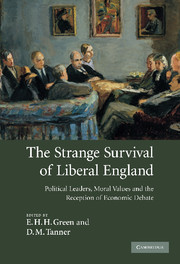 The Strange Survival of Liberal England
The Strange Survival of Liberal England Published online by Cambridge University Press: 04 July 2009
Peter Clarke's first book Lancashire and the New Liberalism luxuriated in the grassroots of politics, but insofar as it acknowledged any individual heroes they were a present and future Chancellor of the Exchequer, Lloyd George and Winston Churchill. These two were pioneers of the progressive policies that were the subject of Clarke's second book, Liberals and Social Democrats. His third book, The Keynesian Revolution in the Making, took for its context the policies of Churchill and the man who succeeded him as Chancellor, Philip Snowden. Finally The Cripps Version, Clarke's sixth and most recent book, is the biography of a politician best remembered as the ‘austerity Chancellor’. This chapter, on two other one-time residents of 11 Downing Street, William Gladstone and Robert Lowe, is also relevant to Clarke's fourth book, A Question of Leadership: Gladstone to Thatcher, because along with Disraeli these were the first two ‘political’ Chancellors in the sense of enjoying a prestige independent of the Prime Minister of the day. Furthermore, their ambiguous relationship illustrates one of the main themes of Clarke's oeuvre, and also of the present volume: the way in which agreements over economic theory and policy can often mask – just as disagreements can often reflect – philosophical differences that have nothing directly to do with economics.
To save this book to your Kindle, first ensure no-reply@cambridge.org is added to your Approved Personal Document E-mail List under your Personal Document Settings on the Manage Your Content and Devices page of your Amazon account. Then enter the ‘name’ part of your Kindle email address below. Find out more about saving to your Kindle.
Note you can select to save to either the @free.kindle.com or @kindle.com variations. ‘@free.kindle.com’ emails are free but can only be saved to your device when it is connected to wi-fi. ‘@kindle.com’ emails can be delivered even when you are not connected to wi-fi, but note that service fees apply.
Find out more about the Kindle Personal Document Service.
To save content items to your account, please confirm that you agree to abide by our usage policies. If this is the first time you use this feature, you will be asked to authorise Cambridge Core to connect with your account. Find out more about saving content to Dropbox.
To save content items to your account, please confirm that you agree to abide by our usage policies. If this is the first time you use this feature, you will be asked to authorise Cambridge Core to connect with your account. Find out more about saving content to Google Drive.